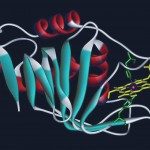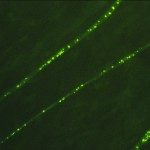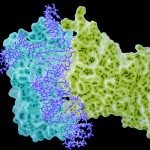Lien vers Pubmed [PMID] – 25748547
Lien DOI – 10.1016/j.pbiomolbio.2015.02.007S0079-6107(15)00017-6
Prog Biophys Mol Biol 2015 Oct; 119(1): 53-9
PDZ (PSD-95/Dlg/ZO-1) domains play a major role in neuronal homeostasis in which they act as scaffold domains regulating cellular trafficking, self-association and catalytic activity of essential proteins such as kinases and phosphatases. Because of their central role in cell signaling, cellular PDZ-containing proteins are preferential targets of viruses to hijack cellular function to their advantage. Here, we describe how the viral G protein of the rabies virus specifically targets the PDZ domain of neuronal enzymes during viral infection. By disrupting the complexes formed by cellular enzymes and their ligands, the virus triggers drastic effect on cell signaling and commitment of the cell to either survival (virulent strains) or death (vaccinal strains). We provide structural and biological evidences that the viral proteins act as competitors endowed with specificity and affinity in an essential cellular process by mimicking PDZ binding motif of cellular partners. Disruption of critical endogenous protein-protein interactions by viral protein drastically alters intracellular protein trafficking and catalytic activity of cellular proteins that control cell homeostasis. This work opens up many perspectives to mimic viral sequences and developing innovative therapies to manipulate cellular homeostasis.








